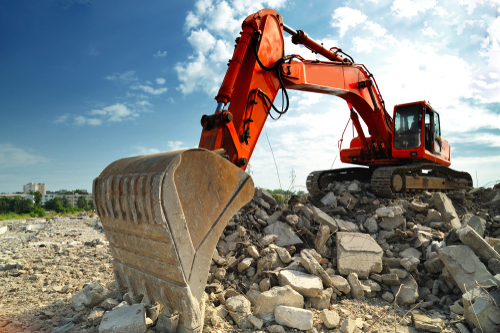Best demolition specialists in Chris Hani, Gauteng
Top demolition specialists near you
Browse the best demolition experts and compare ratings and reviews.
Hire the best demolition specialist
Search Uptasker for the best demolition specialists - compare ratings and read reviews
How can a demolition specialist help me?
Demolition is not just about knocking down existing buildings. It is also a huge factor in clearing land for building purposes, including breaking up and removal of all existing rock, rubble and refuse, levelling the area and preparing a clean and level site for construction and landscaping. If you intend to build on a site which already houses a non-functional or habitable structure and you need to have this demolished, all consequent rubble removed and the ground levelled for building, you need to employ the services of a demolition specialist.
Definition
Wikipedia.org defines demolition as “... the science and engineering in safely and efficiently tearing down of buildings and other man-made structures. Demolition contrasts with deconstruction, which involves taking a building apart while carefully preserving valuable elements for re-use purposes.” Deconstruction applies in the case of historic buildings where architectural elements need to be preserved where possible and re-used in other applications.
Why demolish buildings and structures?
Ultimately, all buildings reach the stage where they have outlived their purpose, are no longer safe to live or work in, or have severely deteriorated past the point of reasonable renovation due to age or lack of maintenance. Such buildings become safety hazards which need to be cordoned off from normal foot traffic to prevent accidents happening. Dilapidated buildings may also become makeshift shelters for homeless persons or drug addicts who leave dangerous and unwanted debris behind. Besides being a blot on the landscape, they occupy valuable land which can be used for other purposes, and as such, need to be demolished and the resulting rubble removed to make way for a new construction. This is where the expertise of a demolition contractor is required. Demolition is a deliberate and purposeful activity in which walls, roofs and any supporting structures are collapsed to bring the building down and the resulting rubble cleared away. Available land in towns and cities is becoming more and more valuable and scarce, and old buildings which have become unusable need to be repurposed or completely destroyed and the site re-used.
Safety factors must be addressed
Before any building or structure is demolished, certain safety factors need to be taken into consideration regarding public safety. If there are hazardous materials such as asbestos or the remains of biological or chemical substances such as mould or lead paint present in the building, these need to be safely removed and contained prior to any actual demolition work being started. If there are utilities such as electricity, gas or water still being fed to the building, these need to be disconnected and all potential live conduits sealed and secured.
Common types of demolition
Conventional demolition
This form of demolition is aimed at smaller projects, using small machines which can be safely operated by one person. This type of demolition is labour-intensive, with a high manual labour quota. It is useful in projects where access to the site is difficult for larger machines and vehicles because of limited space. If the entire building itself is not due to be demolished, and only the upper floors are to be removed, this type of demolition would be the most suitable.
Mechanical demolition
Mechanical demolition relies on large demolition machines, such as excavators fitted with a wide range of additional specialised tools, for example crushing jaws for concrete, shears for steelwork and hydraulic hammers which are capable of breaking many different materials. This type of demolition has the advantage of speed and safety as manual labour on small machines is kept to a minimum, and offers a high precision factor. This method is employed in the mechanical removal of the floors from the top down in high-rise buildings.
Industrial demolition
Large structures such as silos, power stations and steelworks are demolished through this form of demolition. Steelwork is pre-cut for easy collapse prior to demolition, and explosives are then utilised, along with a variety of other appropriate demolition methods on various parts of the building and site. These high-rise building demolitions are achieved through a series of carefully planned explosions which are aimed at knocking out a building's major vertical supports, resulting in the collapse of the building onto itself from the inside out. Many of these explosions start on the lower floors, bringing the upper sections down largely through force of gravity.
How to find the right demolition specialists
Check their online ratings and customer reviews
Demolition specialists are not that easily found and have to be actively sought. They may be found through civil engineering websites, advertisements in industrial and business catalogues and magazines, newspapers, flyers and the Yellow Pages. They are, however, slowly becoming more visible through the internet, and Uptasker is a useful aid in your search. This site provides the names, contact details, links to websites (if available), online ratings and customer reviews of the specialists who undertake demolition in your geographical area, and you may be able to request quotes from various contractors for quick comparison. As with all work which is contracted out, you should take note of customer feedback regarding the services provided, particularly with regard to timing and budget. If the demolition of a structure is integral to the forward movement of a building project where time constraints are a factor, be sure to check that the demolition contractor can adhere to a specified timetable and is able to manoeuvre around specific requirements.
Top demolition specialist tips

Demolition of a structure, whether large or small, necessarily results in rubble which needs to be removed and taken to the dump or recycling area. A demolition contractor will not only attend to the actual demolition itself, but also remove this rubbish and clear the area in readiness for the next project. For more tips, see our demolition specialist articles.
Read Demolition articles
